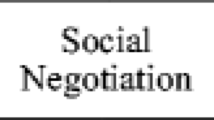Abstract
In collaborative learning, students not only have to acquire knowledge, they also have to learn to regulate the process of acquiring knowledge. In the traditional classroom, the function of regulation rests with the teacher. In the collaborative classroom, however, the responsibility for learning has in part been handed over to the students. We examine how students, who work as members of a community of learners, construct shared understanding. in particular, we want to explore what interactive and discursive tools students use in their collaboration. We present observations made during a series of innovative mathematics lessons in an 8th grade classroom at a Dutch primary school in which children (between 11 and 13 years of age) worked as “researchers” who were encouraged to formulate questions for exploration and to collaborate in answering them. Both in small group discussions and in discussions involving the whole class, students worked on the construction of arguments and the creation of shared knowledge. The construction and diffusion of knowledge occurred in “cycles of argumentation” to which many children contributed and in which ideas were repeated and elaborated upon. Because, in students’ collaboration, learning is made dependent on proposing and critically discussing arguments, the character of knowledge, acquired under these circumstances, is different from knowledge acquired in a more traditional classroom setting.
Similar content being viewed by others
References
Brown, A.L., & Campione, J.C. (1994). Guided discovery in a community of learners. In K. McGilly (Ed.),Classroom lessons, Integrating cognitive theory and classroom practice (pp. 229–270). Cambridge, MA: MIT Press.
Candela, T. (1990). Students’ power in classroom discourse.Linguistics and Education, 10, 1–25.
Edwards, D., & Mercer, N. (1987).Common knowledge. The development of understanding in the classroom. London: Methuen.
Elbers, E., Derks, A., & Streefland, L. (1995, August).Learning in a community of inquiry. Teacher’s strategies and children’s participation in the construction of mathematical knowledge. Paper presented to the 6th European Conference for Research on Learning and Instruction, Nijmegen.
Elbers, E., & Streefland, L. (2000). Shall we be researchers again? Identity and social interaction in a community of inquiry. In H. Cowie & D. van der Aalsvoort (Eds.),Social interaction in learning and instruction. The meaning of discourse for the construction of knowledge (pp. 35–51). Amsterdam: Pergamon Press.
Forman, E., Larreamendy-Joerns, J., Stein, M., & Brown, C. (1998). You’re going to want to find out which and prove it: Collective argumentation in a mathematics classroom.Learning and Instruction, 8, 527–548.
Freudenthal, H. (1991).Revisiting mathematics education. Dordrecht: Kluwer.
Goffree, F. (1993). HF: Working on mathematics education.Educational Studies in Mathematics, 25, 21–49.
Hatano, G., & Inagaki, K. (1991). Sharing cognition through collective comprehension activity. In L. Resnick, J. Levine, & S. Teasley (Eds.),Perspectives on socially shared cognition (pp. 331–348). Washington, DC: American Psychological Association.
Latour, B., & Woolgar, S. (1979).Laboratory life. The social construction of scientific facts. London: Sage.
Mercer, N. (1995).The guided construction of knowledge. Talk amongst teachers and learners. Clevedon: Multilingual Matters.
Reusser, K., & Stebler, R. (1997). Every word problem has a solution. The social rationality of mathematical models in schools.Learning and Instruction 7, 309–327.
Rogoff, B. (1994). Developing understanding of the idea of communities of learners.Mind, Culture and Activity, 1, 209–229.
Rojas-Drummonc, S., Hernández, G., Vélez, M., & Villagrán, G. (1998). Cooperative learning and the appropriation of procedural knowledge by primary school children.Learning and Instruction, 8, 37–61.
Scardamalia, M., & Bereiter, C. (1996). Adaptation and understanding. A case for new cultures of schooling. In S. Vosniadou, E. de Corte, R. Glaser, & H. Mandl (Eds.),International perspectives on the design of technology-supported learning environments (pp. 149–163). Mahwah, NJ: Lawrence Erlbaum Associates.
Seixas, P. (1993). The community of inquiry as a basis for knowledge and learning: The case of history.American Educational Research Journal, 30, 305–324.
Streefland, L. (1993). The design of a mathematics course. A theoretical reflection.Educational Studies in Mathematics, 25, 109–135.
Streefland, L., & Elbers, E. (1996, July).Learning and “teaching” in a community of inquiry. Paper presented at the International Conference on Mathematics Education. Sevilla.
Wells, G. (1993). Reevaluating the IRF sequence: A proposal for the articulation of theories of activity and discourse for the analysis of teaching and learning in the classroom.Linguistics and Education, 5, 1–37.
Author information
Authors and Affiliations
Additional information
Until his untimely death in 1998, Leen Streefland was a senior lecturer at the Freudenthal Institute for Mathematics Education of Utrecht University. The address of the Freudenthal Institute is Tiberdreef 4, 3561 GG Utrecht, The Netherlands.
Rights and permissions
About this article
Cite this article
Elbers, E., Streefland, L. Collaborative learning and the construction of common knowledge. Eur J Psychol Educ 15, 479–490 (2000). https://doi.org/10.1007/BF03172989
Received:
Issue Date:
DOI: https://doi.org/10.1007/BF03172989




